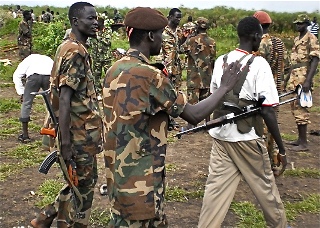SSLA rebels say their presence in South Sudan means peace not war
By Bonifacio Taban Kuich
May 2, 2013 (BENTIU) – South Sudanese rebels who crossed back into the country’s Unity State from Sudan last week said they are committed to peace talks with the government in Juba without any preconditions or demands.

SPLA spokesman Colonel Philip Aguer Payang has confirmed to Sudan Tribune that officials from the national army have visited the rebel’s location in Unity state.
Maj. Gen Kuol said their forces are ready to accept relocation within the Unity state or remain in Mayom county while top leaders negotiate the process of integration into the SPLA by the central government. He said that the rebels had been encouraged by the reception they had received upon their return.
The SSLA’s commander in-chief of Lt. Gen. Bapiny Monytuel is currently in Nairobi and will soon travel to South Sudan capital Juba, Maj. Gen Kuol said, to meet South Sudan’s president Salva Kiir and seal an agreement.
Kiir renewed his offer of an amnesty to South Sudan’s rebel groups on April 25, which was publicly accepted by the SSLA the following day.
The SSLA have 2,316 personnel in Mayom county, Maj. Gen Kuol said, adding that an extra 1,500 fighters, under the command of Lt. Gen. John Uliny are due to arrive in Malakal, the capital of Upper Nile state on Friday.
Maj. Gen Kuol rejected speculations that his group had surrendered to the SPLA, emphasizing that the SSLA had simply accepted the president’s amnesty in order to join hands towards developing South Sudan.
“We are today in South Sudan for peace not because we have threat somewhere, but our presence in the country is to negotiate and find a peaceful environment for the sake of our people and to bring change to this poor nation, through uniting with one another to discourage tribalism spirit in the country leadership”, added Maj. Gen Kuol.
Tribalism in South Sudan’s ruling party – the SPLM – was one of the reasons the SSLA stated for starting their rebellion after elections in 2010.
“Our presence in Mayom County should reveal to anyone who have doubts or fear in minds that we have serious evidence of trust of peace; if we could not mean peace, we would not have been inside Unity state but we could have been in the bush”, said Kuol.
The rebels have brought with them to Unity state 74 pickup vehicles, ammunition and weapons including anti-aircraft machine guns.
Earlier last month, the Geneva-based Small Arms Survey research group released a report giving alleging that the Sudanese government was supporting David Yauyau a rebel leader in South Sudanese’s eastern Jonglei state. Rebel defectors, who had weapons indistinguishable to those of the Sudanese army, reported Sudanese planes made regular arms and ammunition drops in rebel-controlled areas.
The SSLA rebels groups urged Yauyau to also respond to the amnesty in order to allow for the world’s newest nation to develop and recover from decades of conflict and neglect.
President Salva Kiir offered his amnesty to all rebel groups operating in South Sudan after he took his oath of office in 2011, re-issuing it last month and called on rebels who took up arms against government to lay down arms for peace. His decree reiterated that rebels who accepted is offer would not face trial or prosecution.
Many of South Sudan’s other armed groups have their roots in the 1991 split in the SPLA at the height of the civil war with Khartoum. Some of those who broke away from the SPLA – including South Sudan’s current Vice President Riek Machar – rejoined the movement before the 2005 peace deal that led secession in 2011.
Others groups were integrated into the SPLA following the 2006 Juba declaration.
The SSLA was established in April 2011 with the release of the Mayom declaration and included some of those involved in previous groups that split from the SPLA and were backed by Khartoum during the civil war.
In August 2011 the SSLA’s then leader Peter Gadet declared a ceasefire and was welcomed back into the SPLA but he failed to convince the majority of the group to follow him.
(ST)
